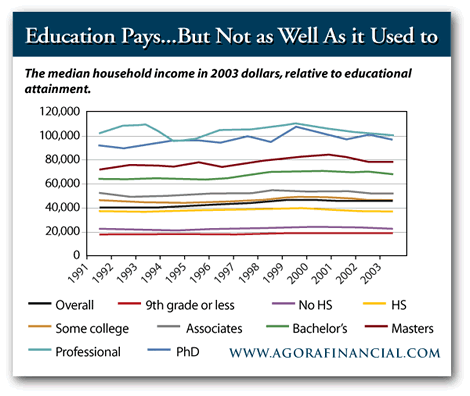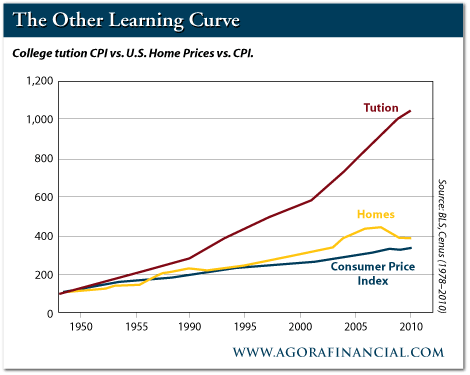How far does a university degree get you? If you think you’ll automatically earn a better job, status, and higher pay, congratulations. You’ve bought into the myth.
Higher education in America is a bubble. There are exceptions, of course. What Big 3 consulting firm can argue with a Harvard MBA? But by and large, the trend is clear.
This bubble, according to Agora Financial’s Eric Fry, is rooted in a belief:
Once upon a time, a college education in America was a one-way ticket to a high-paying job and a lofty socio-economic status. Part of its value derived from the fact that a college education was relatively rare. In 1950, only about 5% of all Americans held a bachelor’s degree.
Since this 5% tended to fare so much better than the rest of the American population, lots of folks began to ask themselves, “Why not send as many kids as possible to college?”
The number of Americans with college degrees has increased fivefold since 1950, according to Fry. Meanwhile, the amount families pay for a higher education has “skyrocketed 439 percent since 1982. Normal supply and demand can’t begin to explain cost increases of this magnitude,” writes to the Washington’s Examiner’s Glenn Harlan Reynolds, quoting an article in Money Magazine.
Two things are behind this increase:
1) Easy Money
Sallie Mae, the student lending powerhouse initially formed as a government-sponsored enterprise in the 1970s, made it easy for students, many with poor to no credit, to get their hands on billions of dollars in federally insured student loans.
Fry writes:
According to FinAid.org, the total amount of money Americans have borrowed on government and private student loans at $830 billion has surpassed the total American consumer balance on credit cards, only $827 billion.
Media reports indicate that many of these students don’t clearly understand the terms of their loans. Once they graduate college, they’re shocked by higher loan payments than they can afford.
Yet higher education is one of the most profitable business markets in the country. No school, whether government-run, non-profit or private, benefits from teaching students how to choose an affordable degree before they actually go out and get one.
For example, there’s no point to spending $100,000 on a Harvard degree in, say, social work if your employers a) don’t care where your Masters is actually from, and b) your salary will only go as high as $40,000 per year. Students should always make sure the math adds up before getting a degree. But that’s not something openly promoted in the marketplace. And why would it be?
The belief that a college education automatically gets you a higher-earning job also “spawned myriad scholarship programs (and) a college-construction boom,” writes Fry:
Were it not for Sallie Mae, aspiring college graduates could never have borrowed far more money than they could ever hope to repay; universities could never have begun to believe that they are worth what they charge; professors could never have obtained their coddled lifestyles and the cost of a college education could never have appreciated well beyond any connection to its true economic value.
Despite this, universities perpetuate the belief that every degree they offer is equally valuable.
2) A Proliferation of Colleges
Online universities, especially for-profit ones, have proliferated in recent years. Non-traditional students–stay-at-home parents, people seeking a second career, students who don’t qualify for traditional universities, etc.–find online universities especially compelling. They comprise an influx of people getting degrees.
For-profit colleges operate under one rule of thumb: He who markets the hardest, gets the most business. Efforts range from recruiters’ compensation being tied to enrollment numbers to a relentless affiliate online marketing effort (Google “online colleges” and you’ll see what I mean).
For-profits also avoid failing students. They need to keep their customers happy. In many cases, students pay a lot of money (or take on a lot of debt) for their degrees. They expect to pass. It’s not in the school’s best interest to fail students, or even give them marginal grades.
Yet issuing degrees to incompetent students devalues degrees in general. If anyone can get a degree, what exactly does it prove? As the percentage of the workforce with college degrees has gone up, degrees, with some exceptions, have become less valuable.
Indeed, according to this AZ Central article:
Nationally, for-profit schools had the highest share of defaults in the United States in 2007: 11 percent. Community colleges had a nearly 10 percent rate, and private, non-profit universities had the lowest rates, at 3.7 percent, according to the U.S. Department of Education.
School officials say for-profit colleges serve an important role. Like community colleges, they have more-lenient admission standards and attract larger percentages of students in economic need: lower-income, minorities and older than 25. Officials say this explains why more students struggle with repaying student loans.
In other words, the for-profit system has attracted many students who can’t afford their education, but get degrees anyway.
What’s the Real Value of a Degree?
The Washington Examiner’s Glenn Reynolds says there are threes ways a college education can help people make more money:
First, it may actually make them more economically productive by teaching them skills valued in the workplace: Computer programming, nursing or engineering, say.
Second, it may provide a credential that employers want, not because it represents actual skills, but because it’s a weeding tool that doesn’t produce civil-rights suits as, say, IQ tests might. A four-year college degree, even if its holder acquired no actual skills, at least indicates some ability to show up on time and perform as instructed.
And, third, a college degree — at least an elite one — may hook its holder up with a useful social network that can provide jobs and opportunities in the future.
While an individual might rationally pursue all three of these, only the first one — actual added skills — produces a net benefit for society. The other two are just distributional — about who gets the goodies, not about making more of them.
But many universities, especially for-profit ones, don’t want you to know that.


